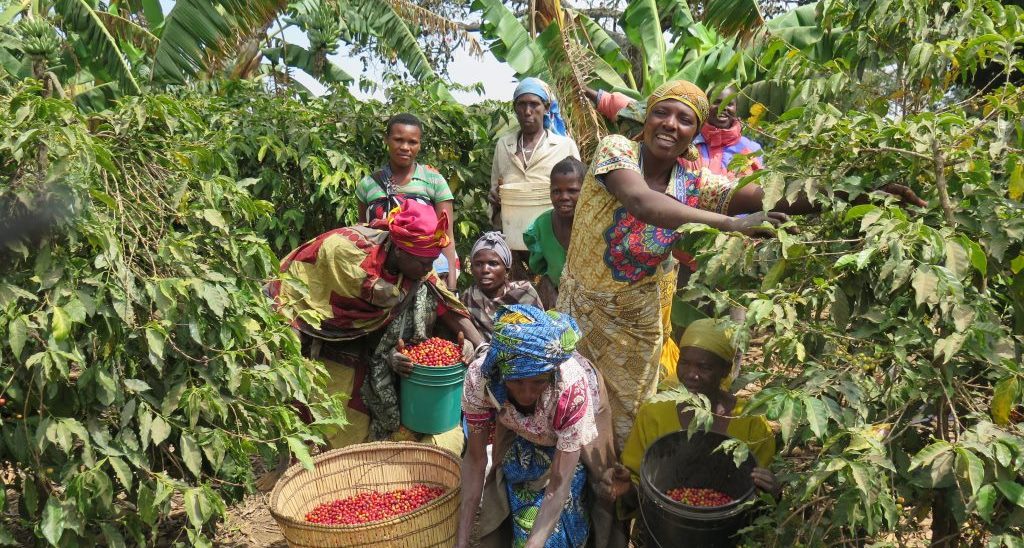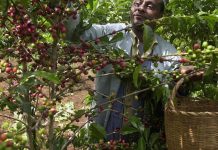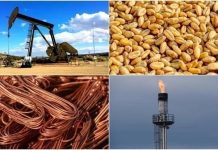AfricaPress-Tanzania: AT least 1.5 million clonal coffee varieties, which are resistant to coffee wilt disease (CWD), have been distributed to farmers in Kagera Region to boost coffee production.
Kagera Region has embarked on the implementation of a five-year plan to increase coffee production from 75,000 metric tonnes to 200,000 metric tonnes by 2025.
Kagera Regional Commissioner (RC), Brig-Gen Marco Gaguti, appealed for increased coffee productivity to bring the region back to its original glory.
Equally, he directed district councils to set aside enough land for the youth to engage meaningfully in coffee production.
He noted that in five years (2020-2025) the government in collaboration with other stakeholders, including Tanzania Coffee Board (TCB), Café Africa Tanzania, Tacri, cooperative unions, the Prisons Department of Tanzania and the private sector was keen on increasing coffee production from 75,000 metric tonnes to 200,000 metric tonnes.
“In past three years coffee production in the region increased from 52,000 metric tonnes in 2018/19 to 78,300 metric tonnes in 2020/21, enabling farmers to get 96.4bn/-. Farmers are encouraged to plant clonal coffee varieties which are resistant to coffee wilt disease (CWD) for increased crop yield and earn more money,” he said.
TCB Regional Manager Melkiad Massawe told ‘Sunday News’ in an interview that 1,300,000 improved Robusta coffee trees had already been distributed to farmers for the planting season.
Café Africa Tanzania Programme Manager Daniel Mwakalinga, on the other hand, explained that they had already produced at least 300,000 improved Robusta coffee trees.
Tanzania Agricultural Bank (TADB) has for three consecutive years issued about 98bn/- loans to Kagera farmers to boost coffee production.
TADB Managing Director Japhet Justine revealed that 45bn/- was issued in 2018, 30bn/- in 2019 and 23bn/- last year.
Apart from supporting farmers, it was evident that the agricultural sector was bankable and appealed to other financial institutions to channel their finances through it.
“The agricultural sector is bankable and for Kagera Region it has minimised smuggling and exploitation,” he remarked.
The TADB MD said the loans issued to farmers were of low interest rates, hence urged cooperative unions in the region to pay farmers on time.
He noted that the farmers will now benefit from the reduced interest rates of 9 per cent from 12 per cent aimed at reducing costs and increase productivity for farmers.
Kagera farmers produce Robusta coffee which constitutes 30 per cent of the total coffee production in the country. However, coffee produced by small-scale farmers was threatened by smugglers who used to take farmers’ produce at a throw-away price to neighbouring countries.
Coffee farmers in Kagera Region have been historically smuggling the crop to neighbouring countries, while some were selling them in an informal system called “butula”.
Robusta coffee is high yielding and resistant to the coffee berry disease. A well-managed Robusta coffee plant could produce up to 2kg, enabling a farmer to pocket at least 6,000/- per kg compared to the current 1,200/- per kg.
Clonal coffee yields three times more coffee and is resistant to coffee wilt disease. The word clonal means that coffee plants have been multiplied asexually from a single parent plant or clone.
Coffee is grown in Bukoba, Muleba, Karagwe, Kyerwa, Ngara and Missenyi districts in the western areas along Lake Victoria. This constitutes about 30 per cent of the total coffee production in Tanzania.
However, for quite a long time the average production stood at 0.32kg per tree due to lack of proper management, while most of the coffee trees are over 60 years old.
Key challenges experienced by smallholder farmers include poor extension services, high costs of inputs, adulterated inputs, low coffee price, and the minimum level of engagement of the youth in coffee production.
Other challenges are poor institutional support, poor marketing systems and effects of climate change. All these challenges have contributed to low coffee productivity, poor coffee quality, low farm gate prices and coffee racketeering.







